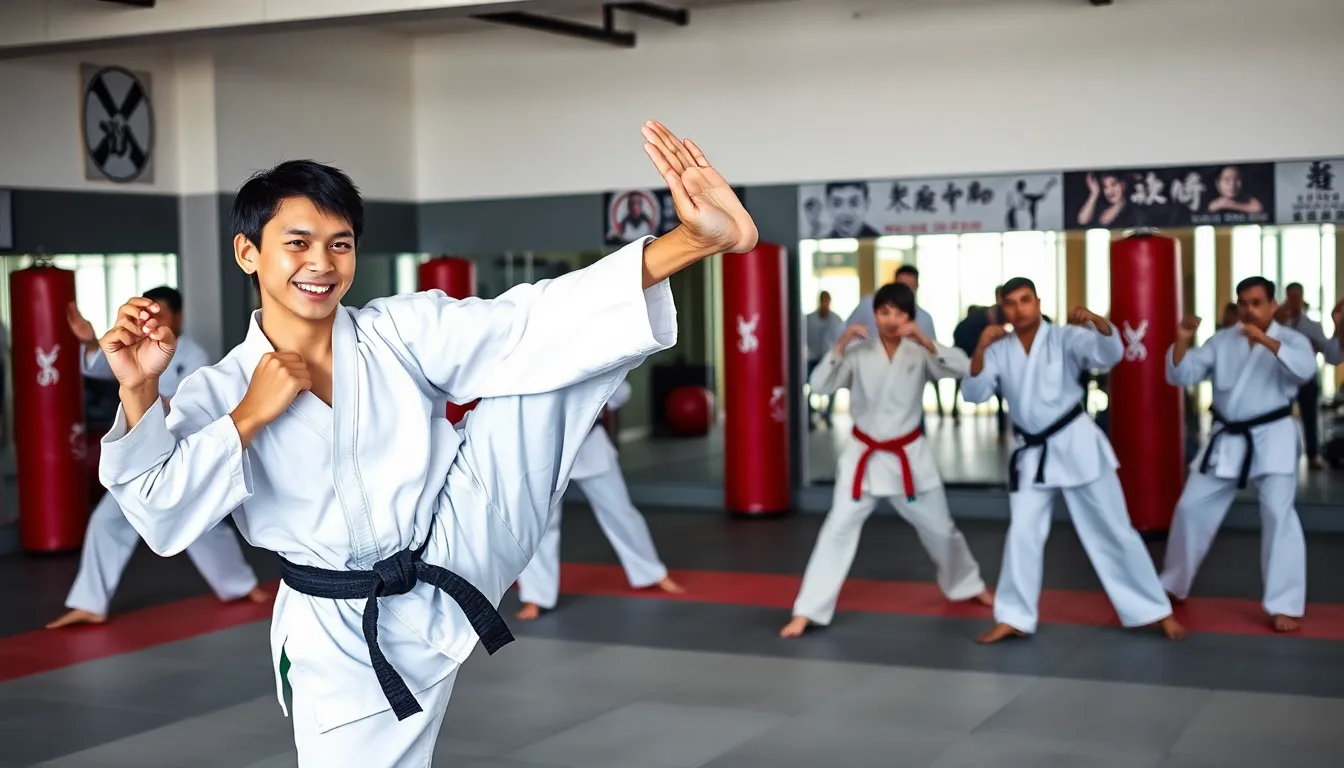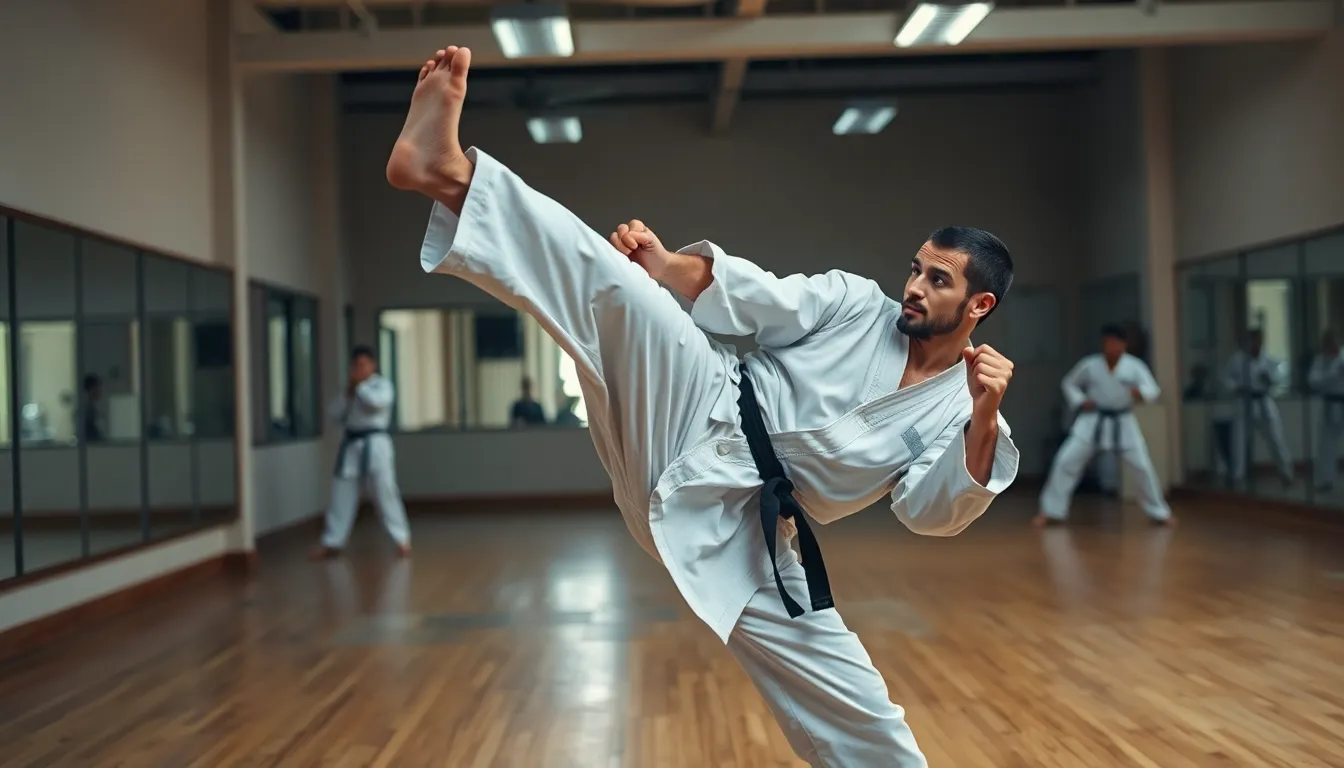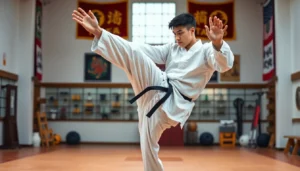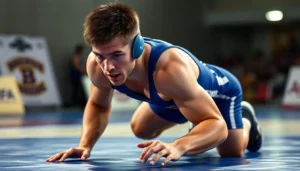Table of Contents
ToggleMartial arts enthusiasts embody a unique blend of passion, discipline, and physical prowess. From the graceful movements of karate to the intense grappling of Brazilian jiu-jitsu, these individuals dive deep into the world of martial arts, seeking not just self-defense skills but also personal growth and mental resilience.
For many, martial arts serve as a powerful outlet for stress and a way to build community. Whether training in a dojo or competing in tournaments, the camaraderie among practitioners fosters lifelong friendships and mutual respect. This article explores the motivations, benefits, and diverse experiences of martial arts enthusiasts, shedding light on why this ancient practice continues to captivate so many in today’s fast-paced world.
Overview of Martial Arts Enthusiasts
Martial arts enthusiasts engage in various disciplines, motivated by unique reasons. Some practitioners focus on self-defense techniques, acquiring skills to protect themselves and others. Others seek personal growth through rigorous training, enhancing physical fitness, flexibility, and coordination. Mental resilience develops alongside physical skills, helping practitioners navigate challenges both on and off the mat.
Community support plays a crucial role for martial arts enthusiasts. Many participants form strong bonds during training sessions, fostering camaraderie through shared experiences. Competitions provide additional opportunities for social interaction, allowing participants to showcase their skills while building lasting friendships.
The benefits of martial arts extend beyond self-defense and fitness. Practitioners often experience reduced stress levels, improved focus, and heightened self-discipline. Training in martial arts can instill a sense of confidence, empowering individuals in their daily lives. The sustained appeal of martial arts in modern society lies in its holistic approach to personal development and connection with like-minded individuals.
The Benefits of Practicing Martial Arts

Practicing martial arts offers numerous benefits, particularly in the realms of physical fitness and mental health. These advantages appeal to martial arts enthusiasts and contribute to their overall well-being.
Physical Fitness
Martial arts improve cardiovascular health, strength, flexibility, and endurance. Training sessions often involve high-intensity workouts, which help burn calories and promote weight management.
- Cardiovascular health: Regular practice strengthens the heart and lungs, enhancing oxygen flow throughout the body.
- Strength: Various techniques, such as kicks and punches, build muscle stamina and power.
- Flexibility: Stretching routines increase flexibility, reducing the risk of injuries and improving overall movement.
- Endurance: Martial arts conditioning increases stamina, enabling practitioners to perform better over longer training sessions or competitions.
Mental Health
Martial arts benefit mental health through stress relief, enhanced focus, and boosted self-esteem. Engaging in martial arts can significantly reduce anxiety and improve emotional resilience.
- Stress relief: Physical activity produces endorphins, which help alleviate feelings of stress and anxiety.
- Enhanced focus: Training requires concentration, improving overall mental clarity and discipline.
- Boosted self-esteem: Mastering new skills and achieving personal goals in martial arts fosters confidence and a strong sense of self-worth.
Types of Martial Arts for Enthusiasts
Various styles of martial arts cater to enthusiasts, each offering unique techniques and philosophies. Understanding these types helps practitioners find the right fit for their interests and goals.
Traditional Martial Arts
Traditional martial arts emphasize cultural heritage and historical practices. Examples include:
- Karate: Originating from Japan, it focuses on striking techniques, including kicks and punches. Karate promotes discipline and respect through kata (forms) and sparring.
- Taekwondo: From Korea, this style is known for its high, fast kicks and dynamic footwork. Taekwondo emphasizes both physical fitness and a strong moral code, developing perseverance and integrity.
- Judo: A Japanese martial art centered on throws and grappling techniques. Judo builds physical strength and strategic thinking, with a strong emphasis on respect and mutual benefit.
- Kung Fu: A Chinese martial art rich in diverse styles, Kung Fu incorporates animal movements and philosophical teachings. It fosters balance, coordination, and physical conditioning.
Modern Martial Arts
Modern martial arts focus on practical self-defense, fitness, and sport applications. Examples include:
- Brazilian Jiu-Jitsu (BJJ): A grappling-based martial art that emphasizes ground fighting techniques. BJJ promotes strategic thinking and problem-solving while enhancing physical fitness.
- Kickboxing: Combining elements of boxing and martial arts, kickboxing focuses on striking techniques and cardiovascular conditioning. It provides an excellent workout while developing coordination and strength.
- MMA (Mixed Martial Arts): A hybrid sport integrating various martial arts disciplines. MMA equips practitioners with striking and grappling skills, focusing on adaptability and resilience in combat scenarios.
- Krava Maga: Developed for self-defense, this military-style martial art focuses on real-life scenarios and practical techniques. Krava Maga emphasizes mental preparedness and efficiency under pressure.
Enthusiasts can explore these various martial arts options, discovering which aligns best with their personal goals and interests.
Community and Culture Among Martial Arts Enthusiasts
Martial arts foster deep connections and a rich culture among enthusiasts, uniting practitioners through shared experiences, values, and interests. This community thrives both on the mat and online, providing support and growth opportunities.
Events and Competitions
Events and competitions play a vital role in the martial arts community, showcasing skills and dedication. Local tournaments offer practitioners chances to test their abilities, gain experience, and meet like-minded individuals. Larger competitions, such as state and national championships, provide exposure to a broader network and advanced techniques. Events often include seminars and workshops, where experienced instructors share knowledge on form, technique, and strategy, further enriching the community experience. Dedicated fans support athletes in these events, highlighting the camaraderie and passion within the martial arts culture.
Online Communities and Forums
Online communities and forums have transformed how martial arts enthusiasts connect. Platforms like Reddit and Facebook groups allow practitioners to share experiences, seek advice, and discuss training techniques. These digital spaces foster an inclusive environment where individuals can learn from varied perspectives, regardless of geographical barriers. Members often exchange training videos, tips, and motivational content, creating a collaborative atmosphere. Forums also serve as resources for finding local training centers or connecting with mentors, enhancing the overall martial arts journey.
Martial arts enthusiasts embody a unique blend of passion and discipline that transcends mere physical activity. Their commitment to personal growth and community fosters an environment where friendships flourish and support systems thrive. The diverse styles available ensure that everyone can find a practice that resonates with their individual goals.
As these practitioners continue to hone their skills they not only enhance their physical fitness but also cultivate mental resilience. The holistic benefits of martial arts make it a compelling choice for anyone seeking to improve their overall well-being. Ultimately the martial arts journey is one of continuous discovery and connection that enriches lives in profound ways.




